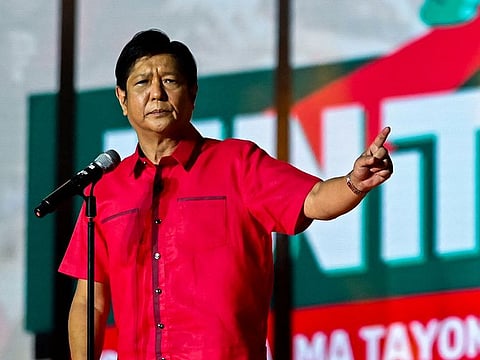Philippines reinforces Asia’s dynastic politics culture
Ferdinand Marcos Jr. is the front-runner in the upcoming presidential elections

Thirty-six years after Ferdinand Marcos Sr. Philippines President fled the country in 1986, his son Ferdinand Marcos Jr is now the front-runner to succeed President Rodrigo Duterte in the Philippines presidential elections set for May 9, 2022.
Ferdinand Marcos Jr. commonly known as Bongbong, a former senator has built, according to Pulse Asia, an enormous 44-point lead over his closest rival Vice President Leni Roberdo. Another estimate puts the lead at 32 points. By the current trends he will win bigger than any of his predecessors in recent memory. President Duterte’s PDP-Laban party has officially endorsed Marcos.
Marcos’s front-runner status is in part the result of his alliance, in a typical Asian style, with three other powerful families in the Philippines politics. In addition to endorsing President Duterte’s daughter Sara Duterte-Carpio for vice-president, Marcos is exchanging support with former President Gloria Macapagal-Arroyo. Her father Diosdado Macapagal also served as the president during the 1960s.
She is expected to serve in the House. Another family exchanging support is that of former President Joseph Estrada whose sons are running for Senate. This four-way alliance demonstrates how the powerful families join together to preserve their political interests, and that power is concentrated among a few in the Philippines.
A polarising figure
Philippines elections can be chaotic. Underdogs have won after catching up with the front runners. This race may narrow further as the polling day approaches. After leading much of the time, Marcos Jr. himself lost the race for vice President to Leni Roberdo during the last elections. He is a polarising figure.
Marcos family returned $3.3 billion of unexplained wealth out of the $10 billion they were accused of amassing during the rule of Marcos Sr. during 1965 to 1986. The external debt soared during this time from $800 million to $23.3 billion. His loyalists continue to insist that it was the golden era of development.
Marcos will benefit from the single round elections where a simple plurality is required to win. In a crowded field of ten candidates, he is likely to be a majority president according to Richard Heydarian a professor of political science in Manila. Marcos’s victory will be a stunning comeback for the family.
Once in office Bongbong is likely to continue to follow some policies of President Duterte and perhaps add some of his own. He is expected to continue with the Duterte’s extrajudicial war on drugs.
Moreover, his likely vice president Sara Duterte-Carpio, who has built a massive lead of her own, has proclivity towards less than democratic norms. He will nonetheless, be expected to run a more organised and businesslike office compared to the unpredictable style of President Duterte.
First priority: Economy
Some liberals feel Marcos’s election will be a counter-revolution to the ouster of his father in 1986, through popular discontent. Nicole Curato, a sociologist and political analyst suggests that Marcos Jr. will not impose martial law like his father did, but he will have the executive power to “undermine institutions that were created in response to his father’s abuse of power.”
With a better run administration under him, Marcos is likely to respond more effectively to several challenges Philippines faces now. Of immediate attention would be the Covid-19 response — though the pandemic has subsided considerably now.
The economy, which was hit due to the pandemic will also need urgent attention. Marcos will also have to pay special attention to correct tremendous social inequality and introduce social welfare programmes to care for the under privileged. Special attention will be needed to upgrade the country’s woeful infrastructure that should spur economic growth.
Marcos Jr. is avoiding mudslinging matches and emphasises on ‘unity’ as the way forward to tackle country’s problems. He is nonetheless, a divisive candidate whom his opponents find easy to target. Many voters blame Philippines current state to excesses during Marcos Sr.’s regime and have decided to vote against him.
At the same time there is a larger segment of population — the younger ones who have not experienced his father regime — who are looking for change especially after a, “succession of administrations which really came short of fulfilling the fundamental ideals and aspirations of the Filipino people,” said Richard Heydarian. Pulse Asia survey indicates 63 per cent of Filipinos between the ages of 24 to 30 want Marcos their next president.
On the foreign policy, Marcos professes friendly relations with both China and the US but is expected to continue with Duterte’s China tilt.
Most experts agree that under the changed circumstances Marcos Jr. is unlikely to follow his father’s afootsteps. But it sure reinforces the culture of dynastic politics in Asia.
Sajjad Ashraf served as an adjunct professor at the Lee Kuan Yew School of Public Policy, National University of Singapore from 2009 to 2017. He was a member of Pakistan Foreign Service from 1973 to 2008 and served as ambassador to several countries.
Sign up for the Daily Briefing
Get the latest news and updates straight to your inbox


